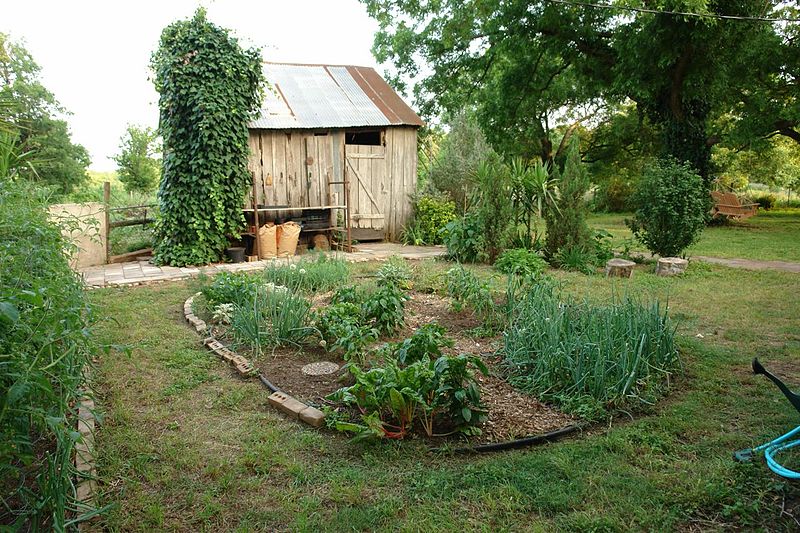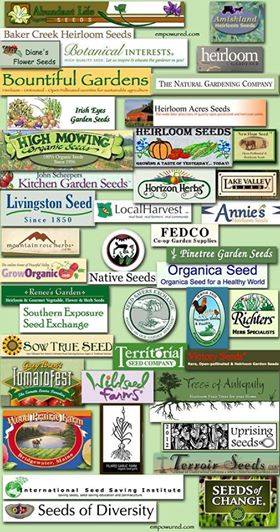Table of Contents[Hide][Show]

Seed catalogs for the upcoming growing season are arriving in mailboxes across the Northern Hemisphere with home growers everywhere starting to plan which seeds they will sow in freshly composted garden. A positive trend in recent years is the growing number of gardening enthusiasts choosing to plant gardens using organic and/or heirloom seeds.
What most of these home gardeners don’t realize is that corporate behemoth and GMO titan Monsanto has been gobbling up the seed market faster than a caterpillar can munch a tomato plant! With one fell swoop in 2005, Monsanto grabbed approximately 40% of the US vegetable seed market with its acquisition of Seminis.
This means that a home gardener could unknowingly be supporting the development and proliferation of genetically modified crops if the seeds used are from Seminis. In addition, Monsanto now apparently owns the trademark for many of the names of the heirloom seed varieties themselves!
Planting a sustainable home garden is much more than just choosing certified organic seeds and seedlings, eschewing pesticides/herbicides and using organic compost. This is because Monsanto has cleverly positioned itself to make money off the home gardening trend.
Does this mean that even if you buy organic or heirloom seeds from a completely independent company some of your purchase might be supporting the bad guys?
Yes, it does.
Surprise!
Home gardeners would do well to bone up on where to purchase their seeds so they aren’t inadvertently doing business with companies that maintain a working relationship with Monsanto-Seminis or were acquired by them.
Buying Organic or Heirloom Seeds Without Supporting Monsanto
Here are the recommended steps for the 2014 growing season for those who want to truly strike a blow for sustainability in every way with their home gardens:

Avoid buying from the seed companies affiliated with Monsanto. Here’s a list of these seed companies by location (enter you zipcode for a list of dealers to avoid).
- Buy from companies Monsanto HASN’T bought and are not affiliated or do business with Seminis: The graphic above indicates numerous companies that are worthy of your patronage as compiled by the International Seed Saving Institute. Please note that this many not be a complete list. If your seed company does not appear, just be sure to clarify with the owner about any potential affiliation with Monsanto-Seminis before buying from them.
- Avoid buying heirloom varieties for which Monsanto owns the trademark.
- Ask seed companies if they have taken the Safe Seed Pledge. Here’s a list of companies that have taken the Safe Seed Pledge and believe in responsible plant genetics. These are good companies to buy from.
Background on Monsanto’s Quest for World Seed Domination
Monsanto’s corporate quest is clearly to make money on each and every one of us whether we choose to eat supermarket frankenfoods produced with abominable, patented GM crops or carefully plant and tend an organic garden at home. Here’s some background information on the subject you may find interesting as well as enlightening:
If you are a home gardener and have information to contribute regarding these steps, please add to the discussion in the comments section. Also, please spread the word via gardening forums you may participate in that folks need to be very careful when seed sourcing for their spring gardens this year else they might be unknowingly supporting Monsanto.
Let’s make this the year when Monsanto’s grip on the worldwide seed market loosens and the movement to seed sustainability gains momentum!
Update
The day after this article was originally published in 2013, the CEO of a large GMO soybean seed company in the Midwest emailed me complaining that the article was short-sighted and insisting that Monsanto is helping feed the starving people of the world. He even went so far as to say that GMO crops are “proven safe”. Click here for the text of this CEO’s entire email plus my written reply.
I have also received email complaints from two other seed companies, one in Canada and one in Arkansas, that do business with Monsanto-Seminis and were offended by what they viewed as inaccuracies in the post. In response, I have adjusted the text slightly and moved linked sources to within the text rather than only listed at the end to make the message of the post as clear and precise as possible so as to not result in any consumer confusion over the information.
I have received no complaints about this article from seed companies completely independent of any affiliation or ties to Monsanto-Seminis.
More Information
Why I Avoid Organic Hydroponic Produce
The Hydroponic Invasion of USDA Organic
Heirloom vs Hybrid Produce
Photography Credit








A few weeks ago Sarah posted an awesome list of seed providers on her website! 🙂 Check it out
Shared!
Well I read one of the above (from Chelsea Nord), who turned out to be a Libertarian-pro-big-corporations-sort-of-a-guy. Biased? Well, just maybe: to save you the effort, here’s the last paragraph:
“Anti-GMO conspiracy theorists should stick to quack science and retreat from their misguided foray into regulatory analysis. GE food poses no threat to human health or the environment. The absurd reaction to this provision shows how desperate the anti-GE crowd has become.”
Not exactly a neutral, objective observer, eh?
Also, the point is not whether or not you’re a shill; the point is that you need to consider the source.
I cant believe this even happened. We can no longer trust our government. I did hear that Obama was looking in to veto this but there was a certain rider missing that would have allowed him to do so?
You can just collect seeds from your organic fruits and vegetables and use those seeds for your garden and know that they are free of GMO.
Is it safe to buy seedlings and how would you know what you’re buying?
Julie, I had no idea. I thought just grabbin some seed pkts at Walmart and planting my garden with no pestisides was good enough. Ahhhhhhh
The seeds will be OK. No one, including Monsanto is making genetically modified vegetables and their seeds yet. This article is pointing out that Monsanto is now selling vegetable seeds although the name on the package will be from a company that is buying seed from a company that is owned by Monsanto. See how complicated things can get? Those who have developed and grow good healthy organic and/or heirloom seeds to sell to a company that in turn sells the seeds to another company such as Burpee or Seeds of Change, finds that now somehow Monsanto is in the mix and making a profit from their seed. I would like to see an article that helps educate the public about how seeds are produced and marketed to the public.
I’m totally on board with this, but I keep hearing this thing he passed is completely untrue and doesn’t even exist. Snopes.com and badskeptic.com said its not true.??? Either way I wish everyone would wake up! I am lucky to live in a great community that is very aware of GMO’s and their danger.
what a disaster- shame on congress and the prez.